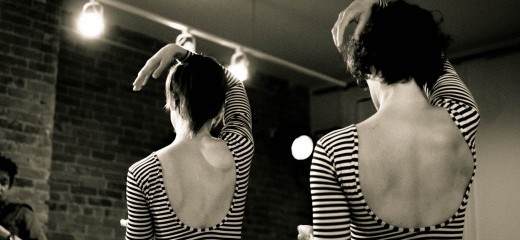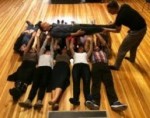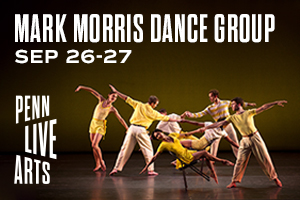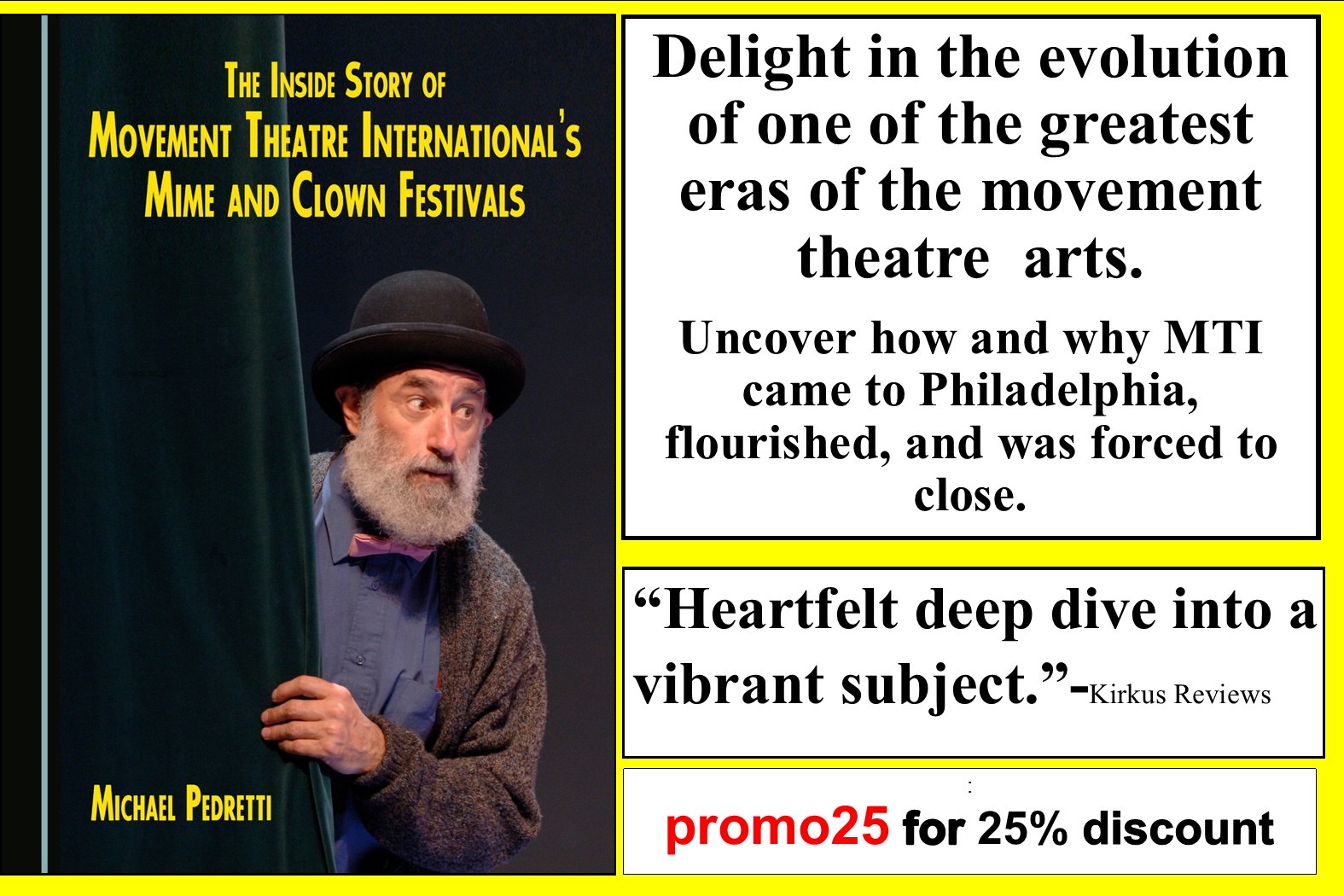
Colony: A Universe of Presence
by Christina Gesualdi
Dancers get their panties all up in a bunch these days over "presence."Deborah Hay, Martha Graham, Miguel Gutierrez, Butoh, clowning, Viewpoints, meditation…
Dancers often follow schools of thought, traditions, techniques and pioneers to get a drink of this magic "presence" Kool Aid.
Are we worried that we'll just disappear?
Are we worried about the moment in performance when people stop watching us?
Presence is very different than just showing up.
Presence is subtle….complex…subjective.
It is not the kind of thing we are born with.
It is not the kind of thing we master once and forever after.
Melissa Krodman, one half of the duo that created and performed Colony has a definition of presence that I can live with, maybe even live by, "I think presence is a combination of [a performer's] energy communication with the material, the space, the audience, and maybe/probably some higher level universe cosmic something." Well, in Krodman and her co-collaborator, Kelly Bond's performance of Colony, the universe must have been buzzing.
A bass driven beat is playing inside studio one. The doors are closed. We wait outside, as the inside pulses like some far off funky washing machine.
We enter. The beat envelops us. Kelly Bond and Melissa Krodman are staggered but close to the entrance, running as if on an imaginary treadmill. They swing their straight arms back and forth alternately and echo these diagonals by pitching their spines forward to achieve a quirky yet calculated shape and rhythm that they maintain in sync. A bright light illuminates the beads of sweat that drips from their foreheads. They stare onward with loaded gazes.
With no chairs in the studio, we, the audience, can allow our own personal sense of etiquette, comfort level, and personal aesthetic to guide us. The audience disperses as if moving into a gallery; I situate myself near the duo. The performers are still running in place; the black and beige stripes of their scoop neck leotards slice space. As their repetition begins to tumble onto itself, playing with its own intricacy, slight changes in rhythm and gait are folded into the mix. This occurs so gradually that the movement begins to look strange, almost foreign. After watching their striped sneakers hit the floor and bounce back up again for minutes at a time, it soon looked as if the floor was made of rubber. This mind game of re-looking again and again then came to a quick halt as the pair found stillness and the room found silence.
Bond and Krodman craft similar sequences with dogged commitment to robotic precision and repetitive flux. The speakers saturate the space in a drone, a consistent echo of the original beat. The women teeter-rock side by side from one straight leg to another. They simultaneously flick a straight arm out. That keeps flicking until it morphs into a subtle wrist curve, and then eventually to a deep elbow bend. The visual composition in each dancer's movement – and more often their stillness – allows us to notice how the stripes on their bodysuits trace the soft contours of their biceps, breasts, and butt. We watch the three-dimensionality of their ribs as they breathe with wide-open mouths, a suspended-yawn-yoga-pranayama.
Yes. This piece is sexy. Krodman and Bond sidestep across the space, gazing at us like sultry showgirls or fosse dancers. Sometimes they even look aloof and hip like the models in American Apparel ads. But their focus is mobile, they look at me as I walk to different part of the room. I wonder if the rest of the audience may be watching this exchange, and then I incorporate that feeling into my experience of the piece.
The synchronous movement in Colony causes me to view Kelly Bond and Melissa Krodman as an incredibly ferocious duo, in tune to each other's every subtlety. Their shared presence is a force to be reckoned with, but they are also wildly distinct. Krodman's focus is "stone hot" instead of stone cold. She is passionate and exudes seriousness as well as daring commitment. Kelly has a softer look. She could easily come off as doe-eyed, but her attention to the present moment is exacting and thoughtful. Toward the end of Colony, the two split up and each one creates moments of intimacy with audience members as she professes, "I'm in love with you." Again the piece uses repetition, and as the performers say this phrase over and over again, my perceived interpretation of the phrase's tone shifts from tender to fake to manipulative to earnest.
Colony unapologetically gazes and is gazed at. It takes on aesthetic pleasure and the body. Perhaps it even takes on sexiness, beauty, control, and even love. Bond and Krodman negotiate these ideas with an efficient sense of precision and boldness.
"Presence" seekers, look no further!
Colony, Kelly Bond and Melissa Krodman, Pig Iron Studio One at Crane Old School, September 16, 2012. No further performances.
By Christina Gesualdi
September 18, 2012









